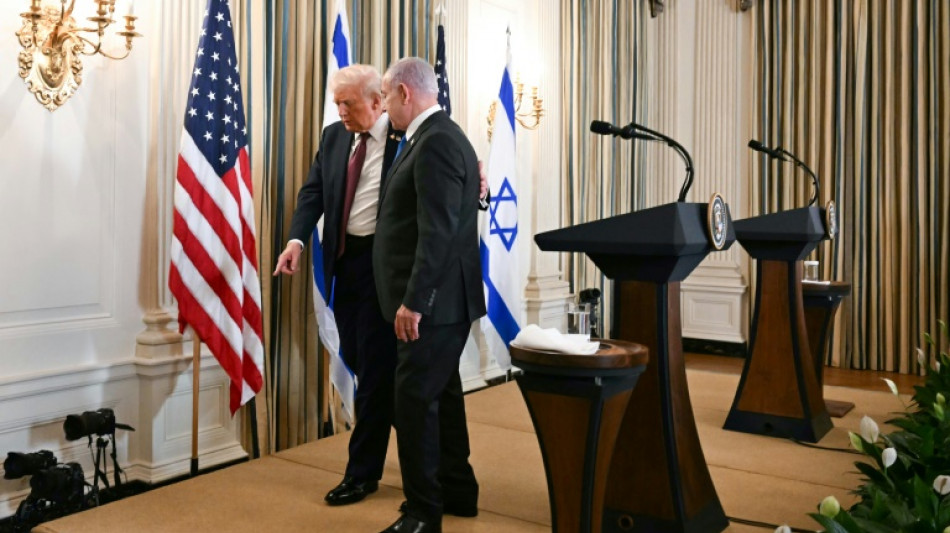

With all-or-nothing Gaza plan, Trump turns tables for Israel
In presenting a Gaza plan as an ultimatum to Hamas, US President Donald Trump has turned the tables to give Israel the advantage diplomatically -- and an even freer rein on the ground if a deal fails.
The White House on Monday released a 20-point plan that would end Israel's relentless nearly two-year offensive in Gaza, win the freedom of hostages and declare a special economic zone under Trump's tutelage.
Both Israeli Prime Minister Benjamin Netanyahu and Trump warned Hamas, whose unprecedented October 7, 2023 attack ignited the war, with Trump saying Tuesday that the group would "pay in hell" if it did not accept the plan within days.
Aaron David Miller, a veteran advisor to US secretaries of state on Middle East diplomacy, said the plan had elements for success but needed far more detail fleshed out, for which Trump may not show the commitment.
"Donald Trump has strategic instincts, but he doesn't have a strategy for how to get from point A to point B," said Miller, a senior fellow at the Carnegie Endowment for International Peace.
"He's a situationalist, he's a transactionalist. He doesn't think these things through. Anchorage is a classic example," he said, referring to Trump's summit in Alaska a month earlier with President Vladimir Putin that ended in vague talk of progress on Ukraine and, like Monday, no questions from the press.
- 'Even blanker check' -
Israel has faced growing outrage over its military campaign. The United Nations has declared famine in part of the Gaza Strip and UN investigators say Israel is committing genocide, charges both rejected by Israel.
Exasperated by Netanyahu, France, Britain and several other Western powers last week recognized a Palestinian state.
Trump, hoping to put Hamas in a corner, reached out to major Arab and Muslim states and presented a 21-point plan last week at the United Nations.
Key Arab and Muslim-majority states -- including peace brokers Qatar and Egypt and key regional powers Saudi Arabia and Turkey -- hailed Trump's efforts but notably did not explicitly endorse the released plan, which was down to 20 points.
Netanyahu and Trump's envoy Steve Witkoff had worked out revisions to the plan, which no longer clearly rules out Israeli annexation of the West Bank, an idea advocated by Netanyahu's far-right allies.
The plan is vague on Palestinian statehood, long opposed by Netanyahu, and it speaks of an eventual "credible pathway."
Brian Katulis, a senior fellow at the Middle East Institute who worked on the Israeli-Palestinian issue under former president Bill Clinton, said Trump's plan was effectively a "fig leaf" to counter a consensus elsewhere on a two-state solution.
"It's not really a deal. It's just reinforcing Israel's attempt to secure unconditional surrender," he said.
"It shows that Trump is willing to sign an even blanker check to Israel if Hamas doesn't agree to this deal.
He said the main success was that Trump was able to "clean the mess that Israel created" by having Netanyahu apologize to Qatar for a strike in the Gulf power on Hamas leaders who were due to discuss a ceasefire proposal.
- Poor record for grand bargains -
Trump, rarely described as detail-oriented, is the unlikely latest world leader to present a comprehensive plan on the Middle East.
Former US president Bill Clinton laid out a far more granular deal to settle the conflict at the Camp David summit near the end of his presidency.
That summit failed, with Israel and Clinton blaming late Palestinian leader Yasser Arafat for not compromising, but some Palestinians questioned whether an all-or-nothing approach was ever going to work on such complex problems.
"The historical record isn't promising on a grand bargain," said Dana Stroul, the former top Pentagon official who is a senior fellow at the Washington Institute for Near East Policy.
"Even going from 21 to 20 points, that's a lot to be implemented and a lot of opportunities for spoilers," she said.
But she said the difference this time was "buy-in from the region" -- and more dire circumstances.
"The humanitarian situation is worse, the choices for the Israeli military and government are worse, Israel's international isolation is worse, and there are fewer living Hamas leaders available to make decisions," she said.
"So I think there are important reasons why we needed an updated framework."
B.Karagiannis--AN-GR



